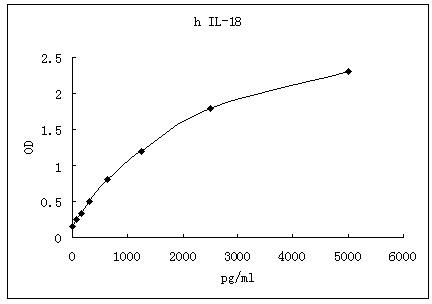Human IL-18 ELISA Kit (48-well)
USD 290.00
3 Weeks*
Specifications
| Product Data | |
| Format | 48-well strip plate |
| Assay Type | Solid Phase Sandwich ELISA |
| Assay Length | 3 hours |
| Signal | Colorimetric |
| Curve Range | 78-5000pg/ml |
| Sample Type | Cell culture supernatant, serum, plasma (EDTA, citrate, heparin) |
| Sample Volume | 20 uL |
| Specificity | Natural and recombinant Human IL-18 Ligand |
| Sensitivity | 20pg/mL |
| Reactivities | Human |
| Interference | No significant interference observed with available related molecules. |
| Components |
|
| Background | Interleukin (IL) -18 is a newly discovered cytokine, structurally similar to IL-1, with profound effects on T-cell activation. Formerly called interferon (IFN) gamma inducing factor (IGIF), IL-18 is a novel cytokine that plays an important role in the T-cell-helper type 1 (Th1) response, primarily by its ability to induce IFN gamma production in T cells and natural killer (NK) cells. In terms of structure, IL-18 and IL-1 beta share primary amino acid sequences of the so-called "signature sequence" motif and are similarly folded as all beta pleated sheet molecules. Also similar to IL-1 beta, IL-18 is synthesized as a biologically inactive precursor molecule lacking a signal peptide which requires cleavage into an active, mature molecule by the intracellular cysteine protease called IL-1 beta-converting enzyme (ICE, caspase-1). Therefore inhibitors of ICE activity may limit the biologic activity of IL-18 and may be useful as Th1 immunosuppressive agents. The activity of the mature IL-18 is closely related to that of IL-1. IL-18 induces gene expression and synthesis of tumor necrosis factor (TNF), IL-1, Fas Ligand, and several chemokines. IL-18 induces the differentiation of Th1 or Th2 cells depending upon cytokine milieu and genetic background. The activity of IL-18 is via an IL-18 receptor (IL-18R) complex. This complex is made up of a binding chain termed IL-18R?, a member of the IL-1 receptor family previously identified as the IL-1 receptor - related protein (IL-1Rrp), and a signaling chain, also a member of the IL-1R family. The IL-18R complex recruits the IL-1R - activating kinase (IRAK) and TNF-R - associated factor -6 (TRAF-6) with subsequent activation of NF kappa B. Thus based on primary structure, three-dimensional structure, receptor family, signal transduction pathways and biological effects, IL-18 appears to be a new member of the IL-1 family. Similar to IL-1, IL-18 participates in both innate and acquired immunity. Constitutive IL-18 expression is detected from many different cells, including macrophages, keratinocytes, and osteoblasts. Human keratinocytes have been found to be the major producers of IL-18 in unprocessed form. An important role of IL-18 has been shown in clinical implications, in the role of IL-18 modulation in tumours, infections, and autoimmune and inflammatory diseases. Elevated serum levels of IL-18 have been shown in patients with acute graft-versus-host disease after bone marrow transplantation. Highly elevated IL-18 bioactivity with highly elevated serum IL-18 levels are measured in hematological malignancies as well as in sepsis. Increased concentrations of plasma IL-18 are found in patients with hepatic dysfunction after hepatectomy and in inflammatory liver diseases. Elevations of IL-18 levels accompany autoimmune disorders like systemic lupus erythematosus and rheumatoid arthritis. Significant levels of circulating IL-18 are found in HIV-1 infection, and other infections, in inflammatory CNS diseases, in Crohn?s disease and in pregnancy during labour and complicated pregnancies. IL-18 is regarded as a novel player in tumour immunotherapy. |
| Gene Symbol | IL18 |
| Standard Curve |

Representative standard curve for IL-18 ELISA. IL-18 was diluted in serial two-fold steps in Sample Diluent.
|
Documents
{0} Product Review(s)
Be the first one to submit a review






























































































































































































































































 Germany
Germany
 Japan
Japan
 United Kingdom
United Kingdom
 China
China